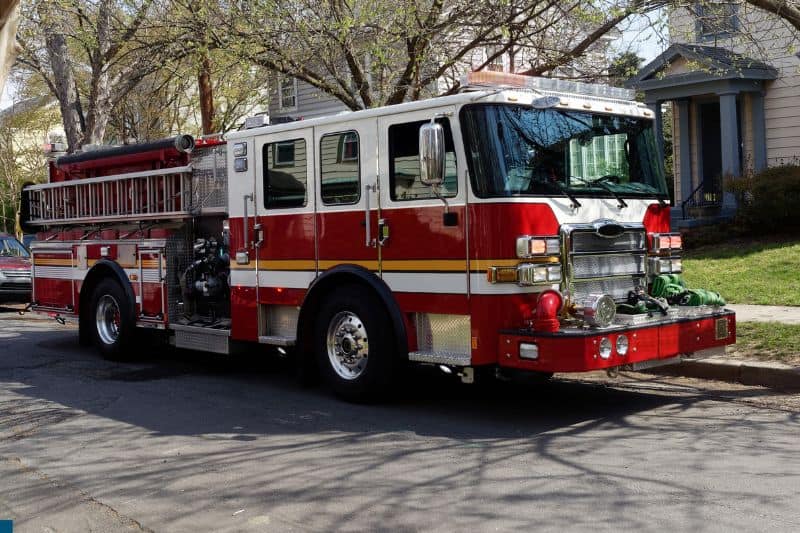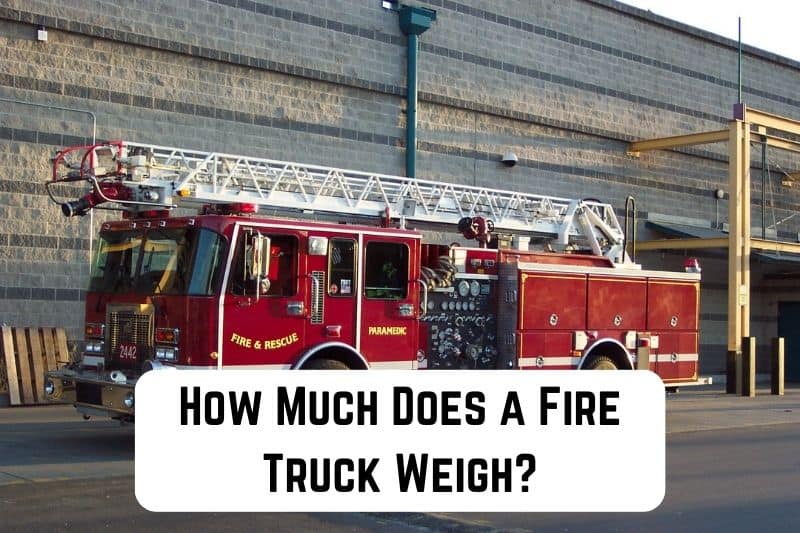Have you ever wondered how much a fire truck weighs? These essential emergency response vehicles are considerably heavier than the average car. In this article, we’ll delve into the details of fire truck weight, exploring the factors that contribute to their heft and comparing them to other vehicles you see on the road.
Fire trucks can weigh anywhere between 19 and 30 tons, which equates to about 38,000 to 60,000 pounds. Even when empty, these powerful vehicles still weigh around 11,500 to 14,500 pounds.
Measuringly.com
It’s interesting to note that, when it comes to weight, only a few other vehicles like garbage trucks or tractor-trailers can surpass fire trucks.
Read: How Much Does a Hockey Puck Weigh: Guide for Hockey Lovers
Components of a Fire Truck
In this section, we will explore the various components that contribute to the weight of a fire truck. Remember that a fire truck’s total weight can range from 19 to 30 tons, or 38,000 to 60,000 pounds.
Chassis and Cab
The chassis and cab are key elements of a fire truck. The chassis provides a robust foundation for all the equipment on board, while the cab accommodates the firefighters and provides space for controls and communication systems. You’ll find that different materials and configurations in chassis and cab construction can significantly impact the overall weight of a fire truck.
Pump and Tank
One of the main features of a fire truck is its pump and tank system. The pump allows firefighters to deliver water from the tank, hydrants, or other sources to extinguish fires.
Tanks on fire trucks can vary in size, with capacities ranging from 500 to several thousand gallons. The size of the pump and tank and the amount of water carried will directly affect the weight of the truck you are dealing with.
Ladder and Rescue Equipment
Many fire trucks are equipped with ladders and rescue equipment for elevated access during firefighting and rescue operations. This can range from simple hook and extension ladders to complex aerial ladder platforms. The type and quantity of these ladders and equipment may add a significant amount of weight to your fire truck.
Additional Accessories
In addition to the main components mentioned above, there are several other accessories that can be found on a fire truck, which contribute to its weight. These may include:
- Hoses and nozzles
- Ground ladders
- Tools and equipment (e.g., axes, pike poles, halligan bars)
- Rescue and extrication equipment
- Breathing apparatus and cylinders
- Personal protective equipment
These accessories, as well as the specific configurations and equipment choices for each individual fire truck, will contribute to the overall weight of the vehicle. In your role as a firefighter, being aware of these factors can help you better understand the workings of your truck and its limitations.
Factors Affecting Fire Truck Weight
When considering the weight of a fire truck, it’s important to remember that several factors can affect the overall weight. As a starting point, fire trucks typically weigh between 12,000 and 70,000 pounds. The average fire truck weighs about 20,000 pounds.
Firstly, fire truck type plays a significant role in determining weight. For example, an engine, which is a fire truck primarily responsible for firefighting, can weigh up to 70,000 pounds. In contrast, other trucks used for different purposes, such as rescue or ladder trucks, may weigh less.
Another factor that affects fire truck weight is the equipment carried onboard. Fire trucks are designed to carry various tools and equipment necessary for firefighting and rescue missions. This includes hoses, ladders, nozzles, pumps, and other specialized gear. The weight of this equipment can significantly affect the overall weight of the truck.
Water weight also plays a crucial role in determining a fire truck’s weight. Fire trucks are equipped with water tanks that can hold several thousand gallons of water to be used for extinguishing fires.
A single gallon of water weighs about 8.34 pounds, so when the water tank is full, the weight of the water alone can add substantial weight to the truck.
Lastly, the fire truck’s construction materials can impact its weight. Modern fire trucks are usually made of a combination of steel, aluminum, and other lightweight materials to reduce weight while maintaining structural integrity and durability.
Keep in mind these factors when looking at fire truck weights, and you’ll better understand why there can be such a wide range in their weight.

Typical Fire Truck Weight Ranges
When considering fire truck weights, it’s essential to recognize that a wide range of vehicles are used in firefighting operations, making their weight vary accordingly. Generally, fire trucks weigh between 19 to 30 tons, which is approximately 38,000 to 60,000 pounds.
Interestingly, even when empty, a fire truck still weighs around 11,500 to 14,500 pounds. This is quite heavy when compared to other vehicles, with only heavy-duty vehicles like garbage trucks and tractor-trailers having a greater weight.
There are several factors that influence the weight of fire trucks, such as their water capacity, equipment, and materials used in their construction. The more water and equipment a fire truck can carry, the heavier it will be. Fire engines, which are primarily designed for firefighting, typically weigh more than other types of fire trucks, possibly reaching up to 70,000 pounds in weight.
In conclusion, the weight of a fire truck largely depends on its purpose and design. Keep this in mind when you encounter fire trucks or discuss their weight with others.
Impact of Weight on Performance and Safety
As a friendly reminder, the weight of a fire truck plays a significant role in its overall performance and safety. Generally speaking, fire trucks can weigh between 19 to 30 tons (38,000 to 60,000 pounds). Even when empty, they can still weigh around 11,500 to 14,500 pounds, making them larger and heavier than most vehicles.
In terms of performance, the weight of a fire truck affects various factors, including acceleration, braking distance, and handling. A heavier fire truck might take longer to speed up and may require additional distance to come to a complete stop. These aspects are crucial since quick response times and efficient maneuvering are essential during emergencies.
Safety is another area where the weight of a fire truck has a significant impact. For starters, heavier fire trucks might put more stress on road surfaces and bridges, which could lead to increased wear and tear or even structural damage. Furthermore, a heavier fire truck could potentially cause more damage in the event of a collision.
One way to address these weight-related concerns is by adhering to the National Fire Protection Association (NFPA) 1901 Standard for Automotive Fire Apparatus. This standard establishes operational and safety criteria for all aspects of fire apparatus, ensuring that fire trucks are designed with safety and efficiency in mind.
In conclusion, recognizing the impact of weight on the performance and safety of fire trucks is essential. By adhering to established standards and maintaining optimal vehicle conditions, you can help ensure that your fire truck remains a reliable and secure resource in times of need.
Vehicles That Fire Trucks Outweigh
You might be curious to know which vehicles fire trucks outweigh and how heavy these emergency vehicles are compared to common ones. Fire trucks typically weigh between 19 to 30 tons or 38,000 to 60,000 pounds.
Cars – When you compare fire trucks to cars, there’s a significant difference in weight. A standard car weighs around 1.5 tons, which is approximately 3,000 pounds. So, a fire truck that weighs 30,000 pounds is 10 times heavier, and those at 60,000 pounds are 20 times heavier than a car!
Ambulances – Although ambulances are also emergency vehicles, their weight is considerably less than fire trucks. The weight of an ambulance can range from 5,000 to 14,500 pounds, making fire trucks considerably heavier.
Pickup Trucks – You might see a pickup truck and think it’s heavy, but it’s still no match for a fire truck. The average weight of a pickup truck is around 4,000 to 6,000 pounds. As a result, even the lightest fire truck will still significantly outweigh a standard pickup truck.
However, it’s important to remember that not all fire trucks weigh the same. They can range from 11,500 to 14,500 pounds when empty. This weight can increase depending on the equipment, water, and personnel onboard.
From this information, you can see how fire trucks are much heavier than many everyday vehicles that you encounter. The massive weight is due to their powerful engines, strong build, and essential firefighting equipment that they carry to protect lives and property.
Vehicles That Outweigh Fire Trucks
While fire trucks are quite heavy, weighing between 19 to 30 tons (38,000 to 60,000 pounds), there are other vehicles that outweigh them. As you explore the world of massive vehicles, you’ll find that some of them are significantly heavier than your average fire truck. Let’s take a look at some examples:
When it comes to construction equipment, mining trucks can be quite impressive in size and weight. These trucks are designed to handle massive loads in challenging conditions and can weigh anywhere from 450,000 to 530,000 pounds, considerably surpassing the 60,000-pound weight of a fire truck.
Another colossal vehicle is the mobile crane. These cranes are used for lifting and moving heavy loads on construction sites and can weigh up to 1.2 million pounds. Imagine the capability needed to lift multi-ton loads at significant heights, and you’ll understand why these machines need to be so heavy.
Notably, some military vehicles also weigh more than fire trucks. For instance, the M1 Abrams, an American main battle tank, tips the scale at approximately 150,000 pounds. With its armor and powerful weaponry, this tank is built to withstand extreme conditions on the battlefield.
Lastly, let’s not forget the behemoths of the sea – ships and cargo vessels. These enormous structures carry massive amounts of goods and people across oceans, and their weight can reach up to 400,000 tons. The immense cargo capacity and sophisticated engineering that goes into these vessels make them some of the heaviest objects ever made.
In conclusion, while fire trucks are indeed heavy, several vehicles out there surpass them in weight. It’s fascinating to learn about these massive marvels of engineering, and it puts into perspective just how diverse the world of transportation can be.

How Much Does an Empty Fire Truck Weigh?
When it comes to the weight of an empty fire truck, you might be surprised to learn that even without the necessary equipment and water, these vehicles still weigh quite a bit. In fact, an empty fire truck typically weighs between 11,500 to 14,500 pounds.
To put this into perspective, let’s compare the weight of an empty fire truck to other everyday vehicles:
- Typical car: 3,000 pounds
- Standard truck: Varies, but usually less than a fire truck
- Ambulances: Usually lighter than a fire truck
- School buses: Similar or slightly heavier than the lightest fire trucks
- Garbage trucks or tractor-trailers: Even heavier than a fire truck
As you can see, fire trucks are among some of the heaviest vehicles on the road, even when empty. This is because they are built with strong and durable materials to protect both the firefighters and their equipment. These factors, combined with the specialized design and features, contribute to the weight of an empty fire truck.
Remember, the given weight range is an average estimate, and the actual weight of a fire truck may differ based on the specific model and any additional components.
Read: How Much Does a Bald Eagle Weigh?
How Much is a Firefighter Truck Worth?
When considering the value of a firefighter truck, it’s important to remember that there’s a wide range of costs depending on factors such as the type of truck, its age, and the equipment it carries. Figuring out the worth of a fire truck can be a bit complex, but let’s break it down into a few key points.
First, it’s crucial to take into account the depreciation of the truck. Depreciation plays a significant role in determining the worth of used fire apparatus. Start with the initial purchase price and apply a depreciation formula to establish the current value.
Another factor to consider is marketplace comparison. Explore similar fire trucks for sale and see how they are priced. Comparisons to others in the market will give you a better idea of what your truck might be worth.
Don’t forget to evaluate the desirability of the truck. Different types of fire trucks will have varying levels of desirability based on features, capabilities, and demand. For example, a basic fire engine with no equipment might cost as little as $250,000, while a more sophisticated vehicle can reach a price of up to $6 million.
To give you a better idea of what to expect, here are a few price points for different fire truck types:
- Basic fire truck or engine: $250,000 – $600,000
- Advanced fire truck with specialized equipment: $600,000 – $1 million
- Top-of-the-line, custom-built fire apparatus: $1 million – $6 million
Keep in mind that these figures can vary depending on factors such as age, equipment, and overall condition. It’s essential to do thorough research and gather as much information as possible to determine an accurate value for your fire truck.
By considering all these factors and staying informed about the market trends, you’ll be well-equipped to understand the worth of a firefighter truck and make informed decisions about buying, selling, or maintaining one in the future. Good luck on your fire truck valuation journey!







